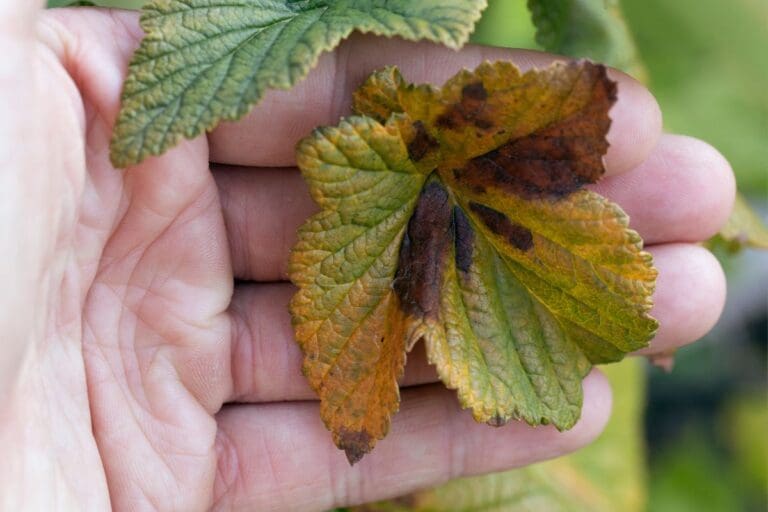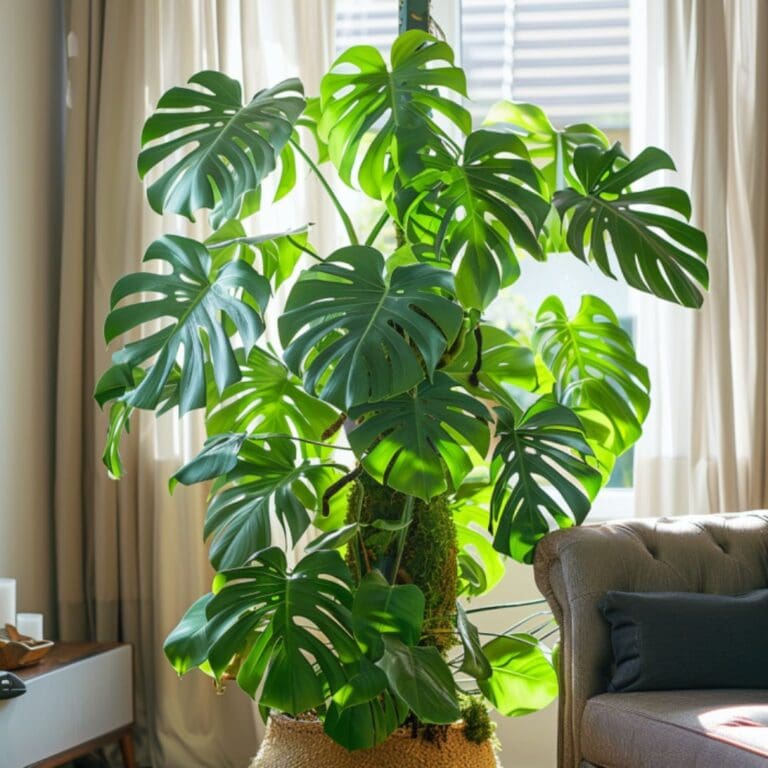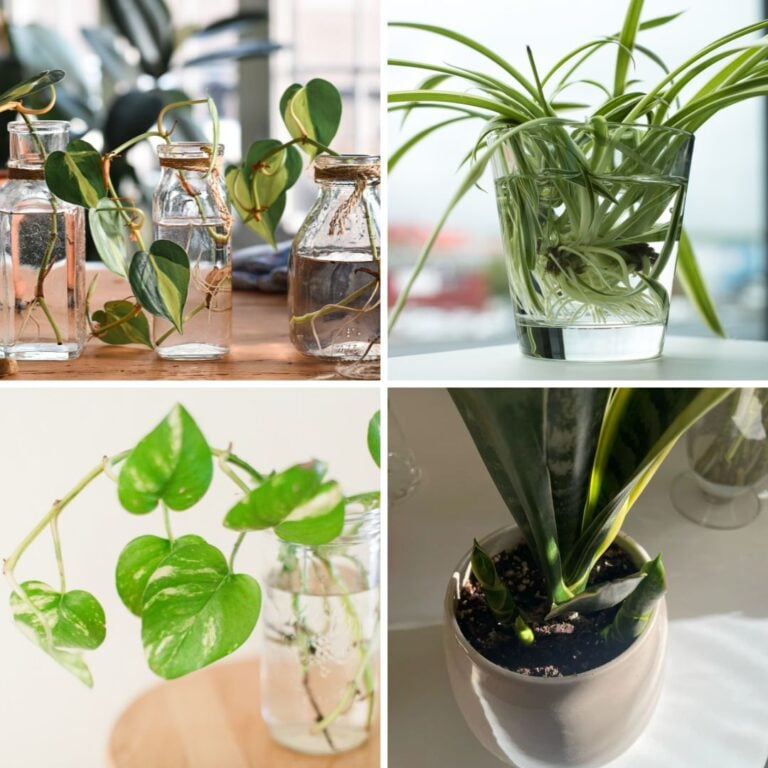It’s Time to Ditch Chemical Fertilizers for One of These Organic Options
Organic fertilizers are like a healthy food smoothie for your garden. Loaded with nutrients and made from natural sources, they promote soil health, reduce pollution, and give that gentle, slow-release food to your plants all season long.
Just think of it as switching out fast food for a wholesome, home-cooked meal – your plants will thank you with lush growth and abundant harvests.
Now, it’s not just about what these fertilizers do for your plants, but also what they don’t do to our environment.
Say goodbye to harmful chemicals leaching into waterways and hello to an eco-friendly garden sanctuary.
Let’s face it, I care about the food I put on my table and the world I’ll pass down to my kids. So why not start with where that food comes from?
Have you ever worried about those unknown additives in chemical fertilizers? I have.
And that’s why I’m turning my back on the synthetic stuff and giving my green buddies what they’ve been craving: compost made from kitchen scraps, aged manure (mind the pre-harvest intervals!), or a DIY blend of all things organic. 🌿✨ What about you?
Are you ready to join the organic revolution and change how you feed your soil? Drop a comment, and let’s chat about it! 🤗👩🌾👨🌾
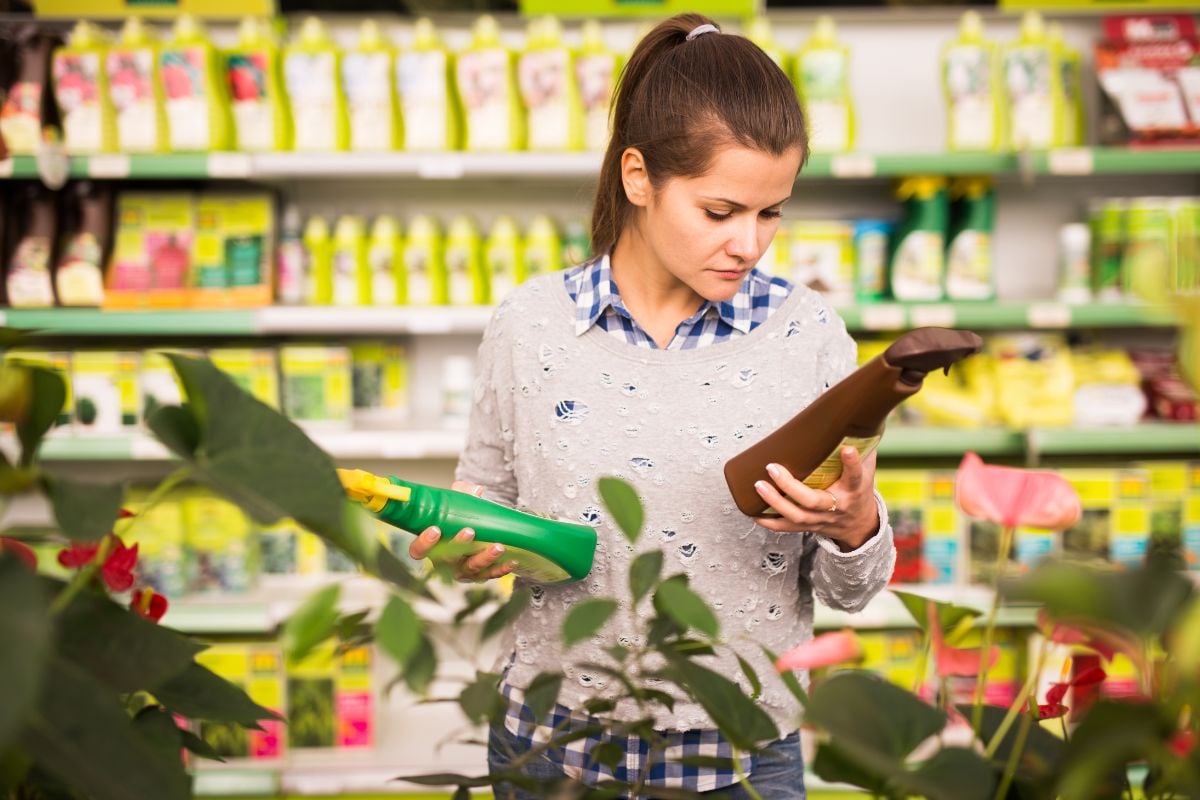
Please note: Simplify Plants is reader-supported. As an Amazon Associate, I earn from qualifying purchases made by our readers with no extra cost added to you all! Some links in the post are affiliate links and I get a commission from purchases made through links in the post.
The Problem with Chemical Fertilizers
When I think of a thriving garden or bountiful harvest, I envision lush greenery and soil that’s alive with activity. But there’s a hidden hitch: chemical fertilizers.
They may pump up plants in the short term, but let’s scratch beneath the surface to see what they’re really doing to our planet.
Environmental Concerns
I’m sure we’ve all heard the buzz about protecting our environment, right? Well, chemical fertilizers are like uninvited guests at nature’s party: they can overstay their welcome and wreak havoc.
They often run off into our waterways, causing things like algal blooms 🌿 that starve fish of oxygen and upend ecosystems.
Plus, the production of these fertilizers emits greenhouse gases. Not cool for our climate goals!
- Runoff: Leads to water pollution and algal blooms.
- Greenhouse Gas Emission: Contributes to climate change.
Health Impacts
Ever wonder if what’s on your plate is contributing to a healthy lifestyle or subtracting from it? Chemical fertilizers on crops can lead to residues in our food, folks!
And these residues? They might be linked to some health problems. So, next time you crunch into that apple 🍏, let’s hope it’s an organic one!
- Residues on Food: Possible health risks.
- Contaminated Water Supply: This can affect drinking water quality.
Soil Degradation
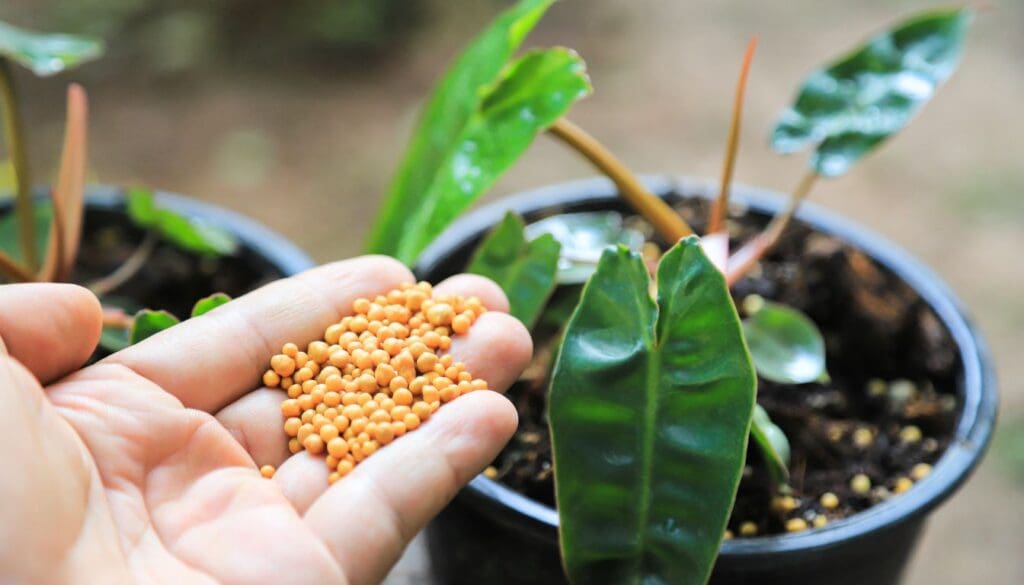
Okay, I promise not to get too sciency, but hear me out. Healthy soil is like a blockbuster movie cast—it’s all about diversity and activity!
Chemical fertilizers can strip our soil of its natural fertility, leaving it dependent on these artificial boosters.
Think of it as soil getting hooked on a not-so-great diet. We want our soil to be teeming with life, not chemical junk!
- Loss of Fertility: Reduced natural nutrient availability.
- Disruption of Soil Life: Less biodiversity and biological activity.
Have you noticed any gardens or farms sticking to organic methods in your area?
Or maybe you’ve got a story about going organic with your own green thumb efforts 🌱? I’d love to hear all about it in the comments!
Don’t forget to share this with friends who dig gardening as much as you do! Let’s grow a movement for healthier soils and a happier planet.
Understanding Organic Fertilizers

Let’s dig into the world of organic fertilizers and unearth the wholesome goodness they bring to our gardens!
Definition and Types
So, what exactly are organic fertilizers? In simple terms, they’re the good stuff from nature—think animal manure, compost, and bone meal.
I love to imagine them as nature’s own multi-vitamins for our gardens, providing a smorgasbord of nutrients in the most natural way. Here’s a quick peek at the different types you might bump into:
- Animal-based: Products like blood meal, bone meal, and fish emulsion pack a protein punch for your plants.
- Plant-based: Options like cottonseed meal and seaweed extract give a gentle, vegetarian nutrient boost.
- Mineral-based: Rock phosphate and green sand contribute minerals straight from the earth’s crust.
Benefits of Going Organic
Why go organic, you ask? Let me sprinkle some insight, like compost on a veggie patch.
First off, going organic means your plants get a slow-releasing feast of nutrients, just like they would in the wild. Plus, you’re not just feeding your plants; you’re nurturing the soil itself! 🌱
Organic fertilizers improve soil structure, increase water retention, and introduce beneficial microorganisms. It’s like throwing a party in the soil, and all the good microbes are invited.
These little creatures break down organic matter, aerate the soil, and help prevent diseases—how’s that for an underground revolution?
Remember, every scoop of organic fertilizer is a step towards a more sustainable future. Do you have any tips for going organic or a funny garden anecdote? Drop them in the comments—I’d love to read them! 🌻💬
Popular Organic Fertilizer Options
In my gardening adventures, I’ve discovered some amazing organic fertilizers that can do wonders for your garden. These options are not just good for the plants but are eco-friendly and sustainable, too. 🌱
Let’s explore some of the popular ones!
Compost

Ah, compost! It’s the all-star of organic fertilizers, and I like to think of it as a garden’s best friend. Made from decomposing organic matter, compost improves soil structure and provides a wealth of nutrients.
Animal Manure
Animal manure from cows, chickens, and horses is like gold for the garden – it’s rich in nutrients and a traditional favorite among gardeners. Just remember to let it age or compost it before using it to avoid burning your plants!
Blood Meal
A bit gory sounding, I know, but blood meal is a powerhouse for nitrogen! Ideal for leafy greens and fast-growing plants. It’s like giving your plants an energy drink (minus the caffeine jitters). 💪
Bone Meal
Speaking of morbid names, bone meal is fantastic for phosphorus. It helps with strong root development and blooms. Think of it as a strength trainer for your plants’ roots!
Fish Emulsion
Fish emulsion might not win any fragrance awards, but your plants will love it for its nitrogen, phosphorus, and potassium. It also contains tiny essential trace elements for overall health.
Worm Castings
Worm castings are worm waste, but don’t squirm, they’re a gentle and nutrient-rich option for your garden. It’s like a spa treatment for your soil.
Green Manure
Green manure involves growing cover crops and then turning them into the soil. It’s a bit like growing your own fertilizer and it helps improve soil texture big time!
Seaweed or Kelp Extracts
Seaweed or kelp extracts are oceanic magic, offering a boatload of minerals and growth hormones. These are like vitamins for your plants.
Cottonseed Meal
Cottonseed meal is a little less known, but it’s slowly making its name as a great slow-release fertilizer that’s high in nitrogen. It’s like a time-released capsule of goodness for the soil.
Alfalfa Meal
If you want to talk about a multi-tasker, alfalfa meal is it. It’s not just a feed for horses; it also perks up the soil with nitrogen, phosphorus, potassium, and even some growth-promoting hormones.
Rock Phosphate
Rock phosphate is a champion for phosphorus, essential for energy transfer and flowering in plants. This is the marathon runner’s diet for your blooms.
Wood Ash
If you’ve got a fireplace, wood ash can be a good potash source, just sprinkle it lightly. But remember, ash can change the pH level, so don’t go overboard, or your plants might go on strike!
Greensand
Greensand is an old-timey favorite, it’s essentially a mineral deposit that improves moisture retention and nutrient release. It’s kind of like a slow-drip IV for the garden.
I’ve tried to keep things short and sweet, just like me when I’ve had too much coffee! 😄 Did any of these catch your eye for your garden? Let me know in the comments, and don’t forget to share this with your fellow green thumbs! 🌼👩🌾
How to Make the Transition
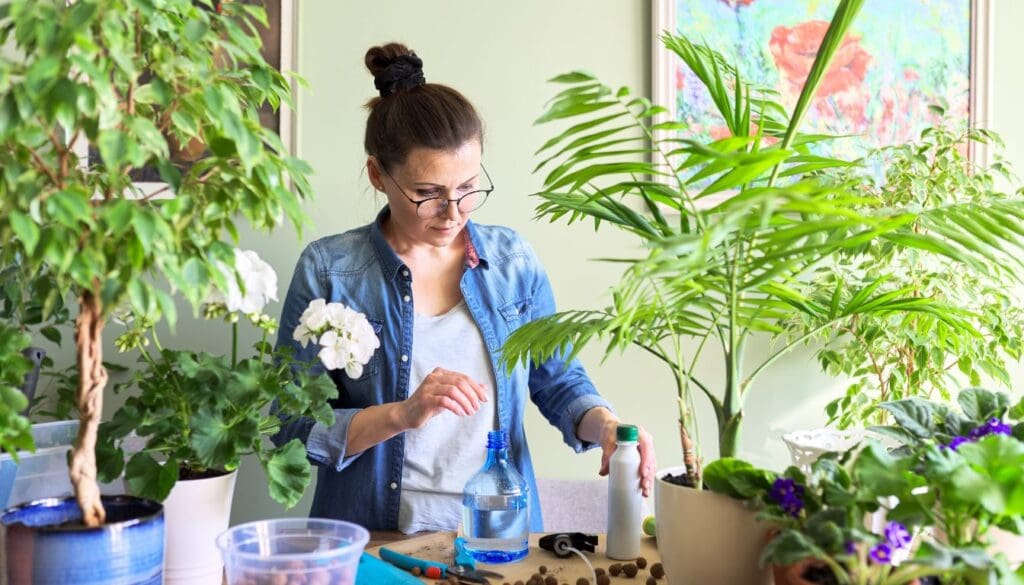
When we talk about moving away from chemical fertilizers, it’s all about giving your soil and plants the organic besties they need. Let’s roll up our sleeves and dig into the nitty-gritty details!
Assessing Your Soil’s Needs
First things first, I get to know what my soil is hungry for.
A soil test is like a report card for your garden; it tells you what’s missing and what’s in surplus. I use this info to create a balanced diet plan for the soil with organic fertilizers that match its needs.
- Nitrogen (N) – Is my soil a bit tired? More organic matter might pep it up!
- Phosphorus (P) – Okay, roots, let’s get you some help with bone meal or bat guano.
- Potassium (K) – Potash is like a power snack for my soil’s overall health.
Application Techniques
I like to think of organic fertilizer application as making a delicious layered cake 🍰 for my plants.
I layer it up with compost, add a pinch of green manures, and sometimes sprinkle some rock phosphate for that secret flavor.
I always blend gently into the topsoil to make sure my plants get all that wholesome goodness without any tummy aches from too much all at once.
Timing and Dosage
Timing in the garden is like catching the bus; you want to be right on schedule. I add organic fertilizers during the plant’s growing season when they’re most hungry and ready to feast.
However, portion control is key—overfeeding can lead to a nutrient party with no guest manners!
Measuring out my organic fertilizers, I follow the recommended dosage on the product label to keep my plants jolly without bellyache.
Tips for using organic fertilizers
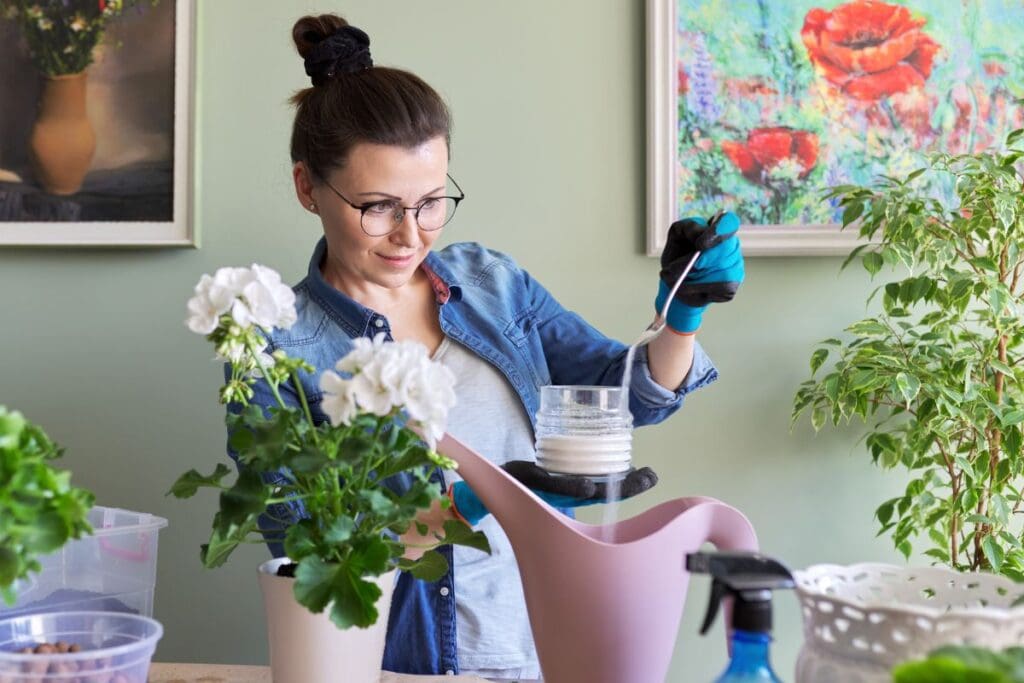
Have you ever felt like a mad scientist with all those chemical fertilizers trying to grow your garden? Well, pave the way for a greener thumb because I’m here to talk about organic fertilizers! 🌱👩🌾
Check the N-P-K Ratio: Sorta-like reading food labels for your diet, checking the nitrogen-phosphate-potassium (N-P-K) ratio on your organic fertilizer ensures your plants get the balanced diet they deserve. Too much nitrogen and you might just grow the world’s largest foliage without a single tomato in sight. 🍅☘️
Timing is everything: Just like you wouldn’t scarf down a sandwich while sprinting, plants prefer their nutrients at the right time. Bone meal is a go-getter, perfect for promoting root growth before planting. Fish emulsion? More of an in-season trendsetter, best used when your plants are already strutting their stuff.
- Bone Meal: Best before planting
- Fish Emulsion: During the growing season
Apply Evenly: ‘Spotlight hogging’ isn’t just a no-no on reality TV. It’s also a bad idea for fertilizers. Use a spreader to avoid clumps of nutrients that could throw your soil’s harmony out of whack.
So, have you tried trading in your lab coat for a pair of gardening gloves yet? Tell me about your switch to organic fertilizers in the comments! 🧤✨ Did your plants throw a party with all that natural goodness? Share your stories; I’d love to hear them!
Conclusion

I’ve been digging into the world of fertilizers, and let me tell you, it’s been an eye-opener! 🌱 Choosing organic options over chemical fertilizers is like picking a homemade cookie over a store-bought one – it just feels right, doesn’t it?
Here’s the dirt: Organic fertilizers come from natural sources like compost, manure, and bone meal. They release nutrients slowly, giving your plants a balanced diet while pampering the soil with organic matter. Plus, they’re kind to our planet Earth! 🌎
So, why should you consider ditching chemical fertilizers?
- Soil Health: Organic fertilizers don’t just feed plants; they enrich the soil with beneficial microbes. Think of them as probiotics for your garden!
- Environmental Safety: Going organic means keeping water sources clean and reducing pollution. 🚱
- Sustainable Farming: It’s about nurturing the land to produce hearty crops for years to come.
If you’re nodding along and thinking about trying organics, I’m right there with you! Let’s make the switch and see our gardens thrive naturally.
🌼 And hey, if you’ve already made the leap to organic, I’d love to hear how it’s going for you. Drop your stories or tips in the comments – let’s get a little garden party started! 🎉
Remember to hit ‘share’ if you think your friends should join in on the organic buzz too! #OrganicGardening #EcoFriendly
Recommended Garden Supplies
| Product Image | Our Recommended Gardening Supplies | Check Offers! |
|---|---|---|
Top Top
Top
Top
Top
Top
Top
Top
Top | rePotme Houseplant and Tropical Classic Potting Soil Mix | Check Offer On Amazon |
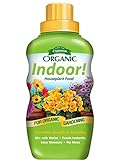 Top
Top
Top
Top
Top
Top
Top
Top | Espoma Organic Indoor Plant Food | Check Offer On Amazon |
 Top
Top
Top
Top
Top
Top
Top
Top | GooingTop LED Grow Light 6000K Full Spectrum Clip Plant Growing Lamp | Check Offer On Amazon |
 Top
Top
Top
Top
Top
Top
Top
Top | Soil Moisture Meter | Check Offer On Amazon |
 Top
Top
Top
Top
Top
Top
Top
Top | Govee Hygrometer Thermometer, Bluetooth Enabled! | Check Offer On Amazon |
 Top
Top | LEVOIT Humidifiers for Large Room(Best For Plants) | Check Offer On Amazon |
 Top
Top
Top
Top
Top
Top
Top
Top | Upgraded DIY Automatic Drip Irrigation Kit, 15 Potted Houseplants Support | Check Offer On Amazon |
 Top
Top
Top
Top
Top
Top
Top
Top | Stainless Steel Heavy Duty Gardening Tool Set | Check Offer On Amazon |
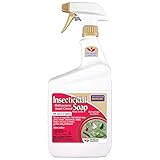 Top
Top
Top
Top
Top
Top
Top
Top | Bonide Insecticidal Soap | Check Offer On Amazon |
 Top
Top
Top
Top
Top
Top
Top
Top | Bonide 32 oz Spray Neem Oil for Organic Gardening | Check Offer On Amazon |
 Top
Top
Top
Top
Top
Top
Top
Top | Garden Safe Fungicide | Check Offer On Amazon |

